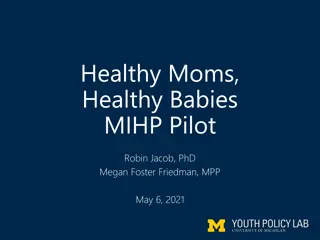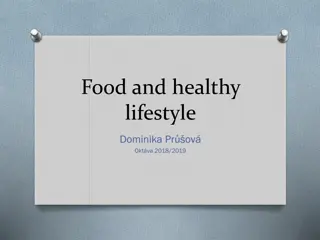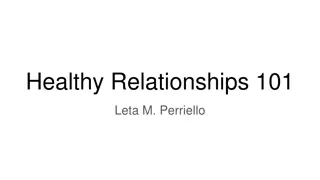
Healthy Future Trajectory Trends Unveiled at Breakfast Event
"Explore the latest trends and insights on the trajectory towards a healthier future discussed at the A Healthy Future? Trajectory Trends Breakfast Event on June 28th, 2017. Discover data, statistics, and analysis on global health improvements, national life expectancy, hidden health needs, emerging markets in healthcare, consumer behavior, and unhealthy lifestyle patterns."
Download Presentation

Please find below an Image/Link to download the presentation.
The content on the website is provided AS IS for your information and personal use only. It may not be sold, licensed, or shared on other websites without obtaining consent from the author. If you encounter any issues during the download, it is possible that the publisher has removed the file from their server.
You are allowed to download the files provided on this website for personal or commercial use, subject to the condition that they are used lawfully. All files are the property of their respective owners.
The content on the website is provided AS IS for your information and personal use only. It may not be sold, licensed, or shared on other websites without obtaining consent from the author.
E N D
Presentation Transcript
A Healthy Future? Trajectory Trends Breakfast 28thJune 2017
Are we getting healthier? We are living longer: Years lost to ill health, WHO Regions 2000 2015 Globally, life expectancy has increased by 5 years since 2000 0 -2 -4 -6 -6.7 -8 -7.5 -7.7 -7.9 -7.9 -8 -8.2 -8.3 -8.4 -8.6 -8.7 -8.8 -10 -9.1 But our healthy life expectancy is only 4.6 years longer -9.6 -12 Source: World Health Organisation
A fragmented national picture Healthy Life Expectancy at birth, 2002-2011 (UK) 68.0 66.4 66.1 65.4 65.3 66.0 64.7 64.2 63.2 64.0 62.5 62.4 62.1 61.9 61.6 61.6 62.0 61.1 60.7 60.6 59.7 60.0 59.1 58.6 58.0 56.0 55.2 54.0 52.0 50.0 Men Women Men Women Men Women Men Women Men Women UK England Scotland Wales Northern Ireland 2002 2011 Source: ONS
Hidden Health Needs UK women diagnosed with depression and feeling downhearted or depressed (by ethnicity) Diagnosed with depression Feel downhearted or depressed all or most of the time 16% 14% 14% 13% 12% 10% 10% 9% 8% 8% 8% 8% 8% 8% 8% 6% 6% 5% 5% 4% 3% 4% 3% 3% 2% 2% 0% Source: Understanding Society, 2014-15
Emerging Markets Healthcare spending as a % of GDP 1996 2014 12.0 9.9 10.0 8.6 8.3 8.0 6.7 5.5 6.0 4.7 3.9 3.8 3.7 4.0 2.9 2.0 0.0 Brazil China India Nigeria World Source: PWC / World Bank Data
Unhealthy Lifestyles? Then Now Obesity (1993-2015) Rising 15% 27% 5 fruit and veg (2001-2015) Stable 24% 26% Current smoker (1993-2015) Falling 27% 18% Exceeds alcohol units (men) (1998-2015) Exceeds alcohol units (women) (1998-2015) Stable 20% 19% Rising 7% 12% Source: Health Survey for England, all adults
Exercise and sport: moments in the day Playing Sports, Exercising (weekday) Weekday (2016) Weekday (2000) 3.5% 3.0% 2.5% 2.0% 1.5% 1.0% 0.5% 0.0% 14:40 19:40 9:40 10:00 10:20 10:40 11:00 11:20 11:40 12:00 12:20 12:40 13:00 13:20 13:40 14:00 14:20 15:00 15:20 15:40 16:00 16:20 16:40 17:00 17:20 17:40 18:00 18:20 18:40 19:00 19:20 20:00 20:20 20:40 21:00 21:20 21:40 22:00 22:20 22:40 23:00 23:20 7:00 7:20 7:40 8:00 8:20 8:40 9:00 9:20 Source: ONS 2000, Trajectory s Study of Time 2016
Decline of deference % agreeing with the following statements, UK 2011 2015 80% 37% of the public trust published medical research 72% 70% 60% 55% 52% 50% 42% 40% 40% 35% 65% trust the experiences of family and friends 30% 20% 10% 0% Individuals should be encouraged to eat and drink more healthily through public health campaigns The companies that produce unhealthy foods and drinks should be paying higher taxes The advertising of unhealthy foods and drinks should be more tightly regulated Source: Academy of Medical Sciences / Trajectory Global Foresight
Personalisation and quantification Efficacy of tracking methods (for all those that track) No Change Positive Impact 80% 70% 70% 60% 47% 50% 45% 40% 30% 24% 18% 20% 7% 7% 10% 4% 0% Technology (computer or mobile) Paper Medical Just in head Source; Fitbit/Trajectory 2013
The decline of wearables? Global Wearable Shipments (millions) 2014 26 2015 82 2016 102 0 20 40 60 80 100 120 Source: Meeker Internet Trends 2017
Consumerisation of healthcare iWantGreatCare.com 23andme
Healthcare delivery Patient-driven Doctor-driven Demand for access to specialists Community based generalists focal point of health service Pill for every ill 24 hour care Prioritisation of data management and telehealth Culture of litigation Very large regional hospital replace smaller district ones Light touch government health campaigns Polarised health outcomes Patient expectations remain high Self-diagnosis Source: Scenarios to inform the Shape of Training Review, (2013)
Medical advances and tech-led delivery Telehealth Personalised medicine New interfaces
Emerging market advantage Source: PWC
Near-term pressures Brexit Cyber Security
Summary Trends in health are complicated by a fragmented population, polarised behaviours and attitudes The health citizen and health consumer are intertwined, as are our short and long term priorities as we balance behaviours We trust doctors, but cynicism about virtually everyone else means we don t always trust medical evidence Quantification is currently safe, fun and convenient but will it become intrusive? Tech change independent of medical breakthroughs can be used to revolutionise care No one is safe from the Assault on Pleasure
Trajectory 22 Upper Ground, London, SE1 9PD + 44 (0)20 8004 4869 trajectorypartnership.com @TrajectoryTweet Tom Johnson, Director tom@trajectorypartnership.com






















